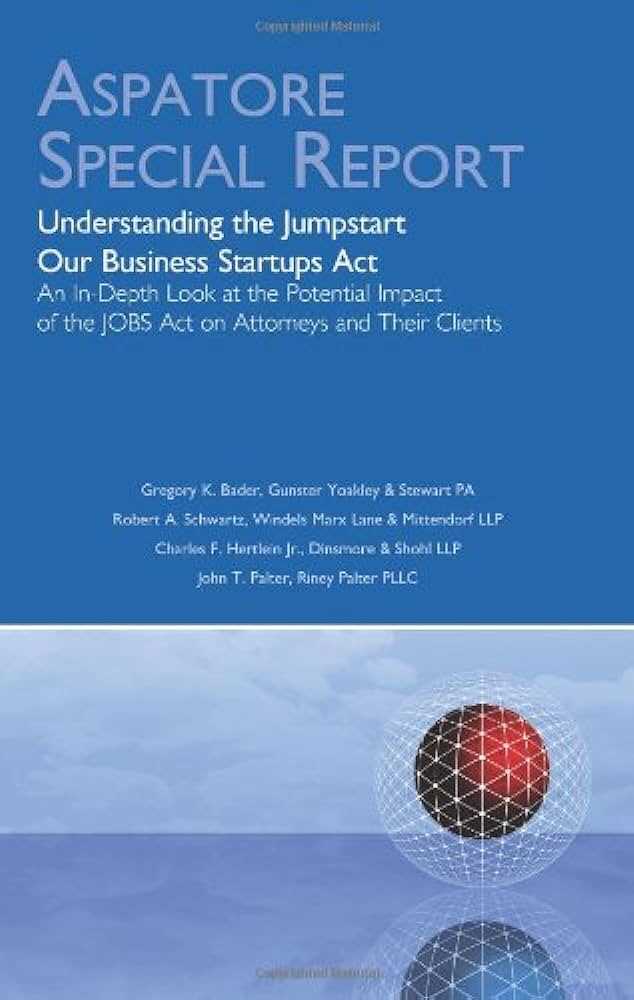Overview of the Jumpstart Our Business Startups (JOBS) Act

The Jumpstart Our Business Startups (JOBS) Act is a piece of legislation that was signed into law in 2012 with the goal of encouraging the growth of startups and small businesses in the United States. The act aims to make it easier for these businesses to raise capital and access investment opportunities.
Under the JOBS Act, startups and small businesses have more options for raising funds, including crowdfunding and online platforms. This allows them to reach a larger pool of potential investors and secure the capital they need to grow and expand their operations.
One of the key provisions of the JOBS Act is the ability for startups to engage in general solicitation and advertising when raising funds. This means that they can publicly promote their investment opportunities, which was previously restricted. This provision opens up new avenues for startups to attract investors and gain exposure.
The JOBS Act also includes provisions that make it easier for startups to go public and access the public markets. It reduces some of the regulatory burdens and reporting requirements for smaller companies, making the process more streamlined and cost-effective.
Overall, the JOBS Act has had a significant impact on the startup ecosystem in the United States. It has created new opportunities for entrepreneurs to raise capital, access investment opportunities, and grow their businesses. By removing some of the barriers that previously hindered startups, the JOBS Act has helped foster innovation and economic growth.
Benefits of the JOBS Act
The Jumpstart Our Business Startups (JOBS) Act offers several benefits to startups and entrepreneurs:
- Access to capital: The JOBS Act allows startups to raise capital through crowdfunding, making it easier for them to attract investment from a larger pool of potential investors.
- Reduced regulatory burden: The act provides exemptions and relaxed regulations for certain types of securities offerings, making it easier and less costly for startups to comply with securities laws.
- Increased visibility: The JOBS Act allows startups to advertise their securities offerings to a wider audience, increasing their visibility and attracting more potential investors.
- Job creation: By facilitating capital raising and reducing regulatory barriers, the JOBS Act promotes the growth of startups, which in turn leads to job creation and economic growth.
- Opportunity for smaller investors: The act allows smaller investors to participate in startup investments, giving them the opportunity to invest in high-growth companies that were previously only accessible to wealthy individuals.
- Encouragement of innovation: The JOBS Act fosters innovation by providing startups with the necessary capital and resources to develop and bring their innovative ideas to market.
Overall, the JOBS Act provides startups with greater access to capital, reduced regulatory burden, increased visibility, and opportunities for both investors and job creation, ultimately contributing to the growth and success of the startup ecosystem.
Key Provisions of the JOBS Act
The Jumpstart Our Business Startups (JOBS) Act is a piece of legislation that was signed into law in 2012. It aims to make it easier for startups and small businesses to raise capital and grow their businesses. The act includes several key provisions that have had a significant impact on the startup ecosystem.
1. Crowdfunding
One of the most notable provisions of the JOBS Act is the crowdfunding provision. This provision allows startups to raise capital from a large number of individual investors through online platforms. Previously, startups were limited to raising capital from accredited investors, which made it difficult for many early-stage companies to access funding. The crowdfunding provision has opened up new opportunities for startups to raise capital and has democratized the investment process.
2. Regulation A+

The JOBS Act also introduced a new type of offering called Regulation A+. This provision allows startups to raise up to $50 million from both accredited and non-accredited investors. This has made it easier for startups to access capital and has provided more investment opportunities for individual investors. Regulation A+ offerings have become popular among startups looking to raise capital without going through the traditional IPO process.
3. IPO On-Ramp
The JOBS Act includes provisions that make it easier for startups to go public. The IPO On-Ramp provision allows emerging growth companies to gradually comply with certain regulations and reporting requirements, reducing the burden and cost of going public. This provision has encouraged more startups to consider going public and has increased the number of IPOs in recent years.
Overall, the key provisions of the JOBS Act have had a significant impact on the startup ecosystem. They have made it easier for startups to access capital, raised the profile of crowdfunding as a viable funding option, and simplified the process of going public. These provisions have helped to foster innovation and entrepreneurship, and have contributed to the growth of the startup economy.
Impact of the JOBS Act on Startups
The Jumpstart Our Business Startups (JOBS) Act has had a significant impact on startups since its implementation. The Act was designed to ease regulations and provide more opportunities for startups to raise capital and grow their businesses. Here are some key ways in which the JOBS Act has affected startups:
1. Increased Access to Capital

One of the main goals of the JOBS Act was to make it easier for startups to raise capital. The Act introduced several provisions that allow startups to access funding from a wider range of investors. For example, it lifted the ban on general solicitation, which means that startups can now publicly advertise their fundraising efforts. This has opened up new avenues for startups to attract investors and secure the funding they need to grow.
2. Crowdfunding Opportunities
The JOBS Act also introduced crowdfunding as a legitimate way for startups to raise capital. Under the Act, startups can use online platforms to solicit investments from a large number of individuals, each contributing small amounts of money. This has democratized the investment process and made it easier for startups to access funding from a diverse pool of investors.
3. Reduced Regulatory Burden
Prior to the JOBS Act, startups faced significant regulatory hurdles when raising capital. The Act introduced several exemptions and relaxed regulations that have made it easier for startups to navigate the fundraising process. For example, it raised the threshold for companies required to register with the Securities and Exchange Commission (SEC), allowing more startups to avoid the costly and time-consuming registration process.
4. Increased Job Creation
By providing startups with easier access to capital and reducing regulatory burdens, the JOBS Act has helped to stimulate job creation. Startups are often the drivers of innovation and economic growth, and the Act has created an environment that is more conducive to their success. With increased funding and fewer regulatory obstacles, startups have been able to expand their operations and hire more employees, contributing to job growth in various industries.

Emily Bibb simplifies finance through bestselling books and articles, bridging complex concepts for everyday understanding. Engaging audiences via social media, she shares insights for financial success. Active in seminars and philanthropy, Bibb aims to create a more financially informed society, driven by her passion for empowering others.
